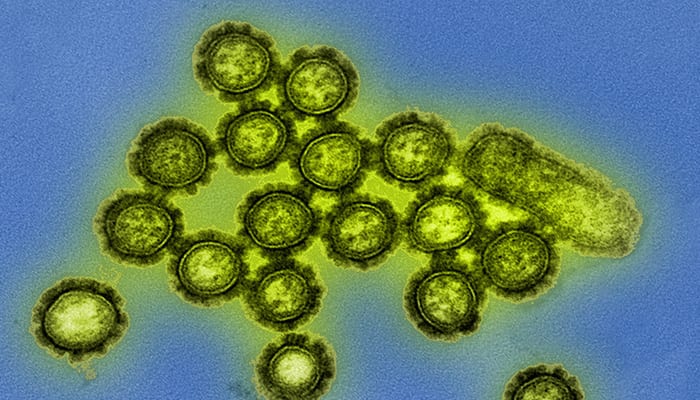News
VirusDetect: a new pipeline for virus identification

A microscopic image of H1N1 influenza virus particles. (Image courtesy of the National Institute of Allergy and Infectious Diseases)
Researchers studying the viruses that affect agricultural production or human health now have a new tool for investigating where viruses have spread, on a local, national, or even global scale.
VirusDetect is a free, open-source bioinformatics pipeline that can efficiently analyze small RNA (sRNA) datasets to identify both known and novel viruses. Boyce Thompson Institute (BTI) Associate Professor Zhangjun Fei and colleagues present this pipeline in a recent paper in Virology.
“We choose this small RNA sequencing technology because it is a highly efficient technology for virus identification and discovery,” said Fei. “VirusDetect is the first bioinformatics tool that is specifically designed to analyze this kind of data for virus detection.”
There are many ways to detect a virus. Traditional methods use microscopes, antibodies or molecular techniques that detect specific sequences of viral genetic material—all techniques that are not highly efficient, especially in detecting novel viruses. With newer sequencing technology, researchers can sequence viral DNA or RNA along with the host material, but this approach requires expensive, deep sequencing, and early, low-level infections can be easily missed.
VirusDetect takes advantage of an antiviral defense system shared by both plants and animals called RNA interference (RNAi). When a plant or animal cell is invaded by a virus, the cell churns out numerous small RNAs that are just 21-24 nucleotides long. By sequencing these small RNAs and feeding the dataset into the VirusDetect pipeline, scientists can predict the presence of RNA viruses, DNA viruses and viroids.
Fei’s lab used this tool to create a Pan-African sweet potato virome, which describes all the viruses affecting sweet potatoes in multiple locations throughout Sub-Saharan Africa. With more than 1,000 field samples, the researchers couldn’t process this much data manually and needed a high-throughput pipeline to identify the known and unknown viruses.
“You can use this strategy to investigate virus distribution, diversity and evolution at a large scale—a continent or even global scale. You can collect samples from all over the world,” said Fei.
This map shows just some of the locations where researchers collected samples to construct the Pan-African sweet potato virome.
Yi Zheng, a postdoctoral scientist at BTI and Shan Gao, a former postdoctoral scientist at BTI and now a faculty member at Nankai University, China, are co-first authors on paper, with contributions from researchers at the USDA and the International Potato Center.
Funding for this project came from the U.S. National Science Foundation (IOS-1110080), the USDA Specialty Crop Research Initiative (2012-01507-229756 and 2010-600-25320) and the CGIAR research program on roots, tubers and bananas.


